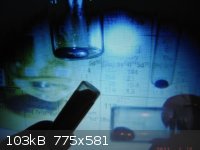| Pages:
1
2
3 |
smaerd
International Hazard
    
Posts: 1262
Registered: 23-1-2010
Member Is Offline
Mood: hmm...
|
|
Hahahaha I love this forum 
|
|
|
497
National Hazard
   
Posts: 778
Registered: 6-10-2007
Member Is Offline
Mood: HSbF6
|
|
Well, I don't want to turn this into a dick sizing competition... but I got you all beat! Fortunately it did not come out of thermometers, though I've
broken more than my fair share of them. Heheh.. I suppose its only a matter of time before some lucky bastard blocks half the picture with their 76
pound flask full of it...
On a more relevant note, according to google saturating impure EtOAc with CaCl2 (I'd leave excess in the still pot) and distilling it directly should
break the azeotropes with water and alcohols. I suspect you may get better results that way.. With a bit of alcohol contamination, you could have way
more water in your EtOAc than you bargained for and still no phase separation. Trying to get that out by letting it sit on CaCl2 then filtering may be
ineffective, or at least inefficient. Of course you'll still have to dry it more thoroughly after distilling from the CaCl2 solution, but at least
there should only be a small amount of H2O/EtOH to deal with.
I wonder what other additives could be used besides CaCl2? There's a lot of options.. Maybe a nonionic hygroscopic compound like glycerol or glycol
could work well? With a liquid hygroscopic agent there would be no limitation on the concentration and you could afford to use a lot. At least they're
very cheap, OTC and reusable. Oh, or use both CaCl2 and glycol/glycerol! 
I'm going to attempt to distill some nail polish remover soon so I'll try to post my results.
Does anybody know where to get the damn current MSDSs for "Cutex" brand non-acetone nail polish remover? I searched high and low, and never found
anything but the acetone based one and some really old ones that don't correspond to the ingredients listed on the bottle.. I couldn't find an MSDS
for the generic Kroger brand version either (which is methyl acetate based according to the bottle.) It's strange because normally I've found MSDSs
for common consumer products are very easy to get. I suppose I'll find out the concentrations of the important stuff soon enough..

|
|
|
Phosphor-ing
Hazard to Others
  
Posts: 247
Registered: 31-5-2006
Location: Deep South, USA
Member Is Offline
Mood: Inquisitive
|
|
I had to get MSDS on everything at our office. The products that were generic store brands I had to call the number on the bottle to get them to fax
the MSDS. Publix in particular doesn't have them online. They will gladly send them to you if you tell them the sku # (the number below the bar code).
"The nine most terrifying words in the English language are: 'I'm from the government and I'm here to help.'" -Ronald Reagan
|
|
|
rrkss
Hazard to Others
  
Posts: 193
Registered: 18-12-2009
Member Is Offline
Mood: No Mood
|
|
I've always shaken my impure EtOAc with a saturated CaCl2 solution and distilled after seperation giving me a good clean product pretty much free from
EtOH. I 1 mL of H2O for every gram of CaCl2 I use and it has always worked well for me.
|
|
|
497
National Hazard
   
Posts: 778
Registered: 6-10-2007
Member Is Offline
Mood: HSbF6
|
|
I got it backwards in my last post, the Cutex stuff has methyl acetate and the kroger product is ethyl acetate. The kroger stuff also has a bunch of
ethanol in it so it makes it a real pain in the ass to purify. Cutex gives a nice clean 95% AcOMe 5%H2O azeotrope which is easily dried with MgSO4 or
CaCl2. Unfortunately Cutex is only 30-40% AcOMe.. Comes to about 30-40$/liter of AcOMe. Not too bad I guess.. Also if you wanted it you get a good
250-350ml of monobutyl diethylene glycol from it, but the purification of that would probably be tougher. I wonder how suspicious people would get
seeing someone buying 10 or 20 bottles of nail polish remover?
Does anyone know of a good ethyl acetate source besides nail polish remover?
|
|
|
sulfuric acid is the king
Hazard to Self
 
Posts: 94
Registered: 11-1-2017
Member Is Offline
|
|
Can Ethyl Acetate be used for nitroparaffin extraction?
|
|
|
njl
National Hazard
   
Posts: 609
Registered: 26-11-2019
Location: under the sycamore tree
Member Is Offline
Mood: ambivalent
|
|
Wow, what a revival. Uhh, extraction from what?
|
|
|
sulfuric acid is the king
Hazard to Self
 
Posts: 94
Registered: 11-1-2017
Member Is Offline
|
|
Mostly water, traces of nitric/nitrous acid...
Will ethyl acetate form some azeotrope with nitroalkanes, or will it be just efficient like diethyl ether.
I try to avoid ether...
|
|
|
njl
National Hazard
   
Posts: 609
Registered: 26-11-2019
Location: under the sycamore tree
Member Is Offline
Mood: ambivalent
|
|
ethyl acetate has an azeotrope with water. My first recommendation is to start by distilling your nitroalkanes out of what I'm assuming was the
nitration mixture, then you can dry the distilled product with either a desiccant, brine/salt wash, or further distillation.
|
|
|
sulfuric acid is the king
Hazard to Self
 
Posts: 94
Registered: 11-1-2017
Member Is Offline
|
|
Yea but for micro scale and with nitroalkanes that have boiling point near that of water that's practically impossible.
I need it for analysis, first extraction, than evaporation, hexane is very bad, it forms azeotrope.
Diethylether, i would need to make it, but it is hard in relatively hot climate..
Ethyl Acetate is only solution (yea i don't have access to DCM)...
I think benzene would also work, but it's carcinogenic...
|
|
|
| Pages:
1
2
3 |